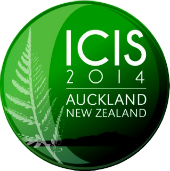IS Curriculum and Education
The rapid evolution of information technologies/information systems (IT/IS), including cloud computing, virtualization, social networking, outsourcing, crowdsourcing, mobile computing, Internet of things and consumerization, is influencing the way information systems are designed, integrated and used in all aspects of society, business and government. This change on how IT/IS infrastructure is offered, designed, integrated and used has major implications for the IS discipline and for IS Education. The anticipated and unanticipated consequences of such paradigm shift will have a major impact on individuals, organizations and society. With growing difference between the industry requirements and the MIS offerings by universities, and information systems and technologies that are embedded in everything we do and touch every aspect of our daily lives, the challenge is to increase relevance of IS/IT education to business and society and develop skills to understand and enhance the role of IS in process management and innovation. The track in IS education will present and analyse these challenges and offer strategies for the future of IS education. It will also provide an opportunity to examine what elements of our core body of knowledge may remain fundamental even in the presence of dramatic changes in industry and society. It will discuss curriculum design, delivery and learning experience of students and provide insights into the development of capable IS and business graduates to deal with these emerging challenges. This track will give opportunities for leading academics to share teaching and learning experiences through scholarship, teaching and learning methods, pedagogy, practice, case studies, technology adoption and curriculum innovations. All research methods and approaches are welcome (conceptual or empirical, design-oriented or explanation-oriented, qualitative or quantitative, and so on). We welcome high quality research papers in any major topic of IS curriculum and education.
Topics of interest include, but are not limited to:
· Curriculum innovations, design and model curricula
· Blended and hybrid learning
· Social networking and learning
· Peer and collaborative learning
· Innovative pedagogy and evaluation
· Doctoral education and research management
· Program assessment and accreditation issues
· Work integrated learning
· Technology-enabled active learning
· Assurance of learning
· Learning management systems and technology mediated learning
· Emerging technologies and IS education
· Massive Open Online Courses (MOOCs)
· Online game-based and experiential learning
· Ethical and social issues in IS education
· E-Learning and asynchronous media
· Teaching cases
Track Chairs
|
University of Queensland |
|
|
Missouri University of Science and Technology |
Associate Editors
|
Anil Aggarwal |
University of Baltimore |
|
Dinesh Batra |
Florida International University |
|
Diana L. Burley |
George Washington University |
|
Tom Case |
Georgia Southern University |
|
Sophie Cockcroft |
The University of Queensland |
|
Sean B. Eom |
Southeast Missouri State University |
|
Mary J. Granger |
George Washington University |
|
Pei-Hsuan Hsieh |
National Cheng Kung University |
|
John Krogstie |
Norwegian University of Science and Technology |
|
Ron Kwok |
City University of Hong Kong |
|
Jiye Mao |
Renmin University |
|
Trevor T. Moores |
ESSEC Business School |
|
Jennifer Nicholson |
Rowan University |
|
Shan Ling Pan |
National University of Singapore |
|
James Sager |
California State University at Chico |
|
Heshan Sun |
Clemson University |
|
Heikki Topi |
Bentley University |
|
Eileen Trauth |
Pennsylvania State University |
|
Gert-Jan de Vreede |
University of Nebraska at Omaha |
|
Sidne G. Ward |
University of Missouri at Kansas City |



